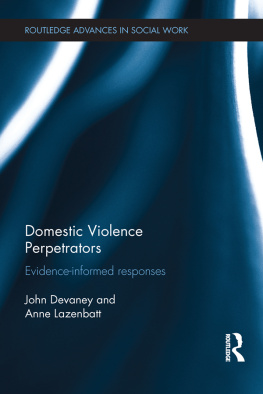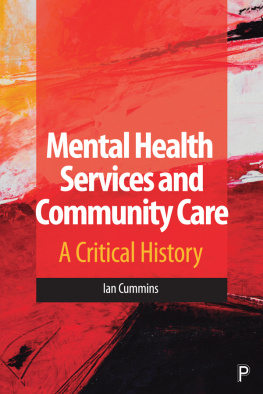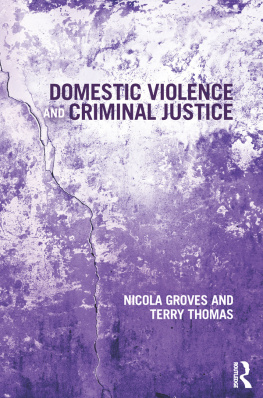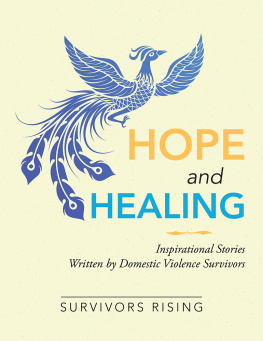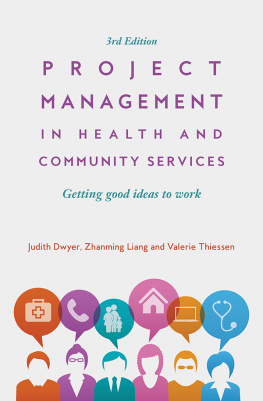ROUTLEDGE LIBRARY EDITIONS: DOMESTIC ABUSE
Volume 2
HELPING SURVIVORS OF DOMESTIC VIOLENCE
HELPING SURVIVORS OF DOMESTIC VIOLENCE
The Effectiveness of Medical, Mental Health, and Community Services
JUDITH S. GORDON
First published in 1998 by Garland Publishing, Inc.
This edition first published in 2016
by Routledge
2 Park Square, Milton Park, Abingdon, Oxon OX14 4RN
and by Routledge
711 Third Avenue, New York, NY 10017
Routledge is an imprint of the Taylor & Francis Group, an informa business
1998 Judith S. Gordon
All rights reserved. No part of this book may be reprinted or reproduced or utilised in any form or by any electronic, mechanical, or other means, now known or hereafter invented, including photocopying and recording, or in any information storage or retrieval system, without permission in writing from the publishers.
Trademark notice: Product or corporate names may be trademarks or registered trademarks, and are used only for identification and explanation without intent to infringe.
British Library Cataloguing in Publication Data
A catalogue record for this book is available from the British Library
ISBN: 978-1-138-67381-6 (Set)
ISBN: 978-1-315-56168-4 (Set)(ebk)
ISBN: 978-1-138-66850-8 (Volume 2) (hbk)
ISBN: 978-1-138-66859-1 (Volume 2) (pbk)
ISBN: 978-1-315-61857-9 (Volume 2) (ebk)
Publishers Note
The publisher has gone to great lengths to ensure the quality of this reprint but points out that some imperfections in the original copies may be apparent.
Disclaimer
The publisher has made every effort to trace copyright holders and would welcome correspondence from those they have been unable to trace.
HELPING SURVIVORS OF DOMESTIC VIOLENCE
THE EFFECTIVENESS OF MEDICAL, MENTAL HEALTH, AND COMMUNITY SERVICES
_______________
JUDITH S. GORDON
GARLAND PUBLISHING, INC.
A MEMBER OF THE TAYLOR & FRANCIS GROUP
NEW YORK & LONDON/1998
Copyright 1998 Judith S. Gordon
All rights reserved
Library of Congress Cataloging-in-Publication Data
Gordon, Judith S., 1958
Helping survivors of domestic violence : the effectiveness of
medical, mental health, and community services / Judith S. Gordon.
p. cm. (Health care policy in the United States)
Includes bibliographical references and index.
ISBN 0-8153-3330-7 (alk. paper)
1. Abused womenUnited StatesPsychology. 2. Abused
womenUnited StatesHealth aspects. 3. Abused womenUnited
StatesFamily relationships. 4. Abused womenCounseling
ofUnited States. 5. Victims of family violenceUnited
States. 6. WomenAbuse ofUnited States. 7. Battered woman
syndromeUnited States. I. Title. II. Series: Health care policy
in the United States (New York, N.Y.)
HV6626.2.G67 1998
362.8292dc21
98-39288
Printed on acid-free, 250-year-life paper
Manufactured in the United States of America
For Paul, Rachel, and Sarah
Contents
I wish to express my sincere appreciation to Drs. Anne Simons, Robert Weiss, Robert Mauro, and Larry Irvin for their important contributions throughout every phase of this project. I also wish to thank my mentors and colleagues at the Oregon Research Institute, especially Dr. Judy Andrews, Pamela Unfried, Barbara Eisenhardt, and Laura Akers, for their invaluable help in the planning, data collection, analysis, and writing stages of this work.
In addition, I am indebted to the staff and volunteers of Womenspace in Eugene, Oregon, for allowing me to conduct my study, and to the women who use their services, whose voices are heard throughout this book.
Finally, I wish to give my most heart-felt thanks to my husband, Paul Schwyhart, for his sense of humor and unfailing support and encouragement of my endeavors, without which I could not have accomplished my goals.
This investigation was supported in part by a grant from the Oregon Research Institute, Eugene, Oregon.
Helping Survivors of
Domestic Violence
The problem of domestic violence is widespread in the United States. While abuse to men by women, and mutual violence, occurs within abusive relationships, the majority of domestic violence cases involve mens abusive behavior towards women, and that abuse has the most serious consequences (Cantos, Neidig, & OLeary, 1991; Vivian & Langhinrichsen-Rohling, 1994; Walker, 1979). According to a recent Surgeon Generals report (USDHHS, 1991), assault by an intimate is the leading cause of injury among women, greater than automobile accidents, muggings, and cancer deaths combined. Current estimates suggest that two to three million women are assaulted by male partners each year in the United States (Straus & Gelles, 1990) and that 2134% of all women will be assaulted by a male partner at some point in their lives. Straus and Gelles (1990) report a 1985 survey which showed that in almost one eighth of married couples, the husband had carried out one or more acts of physical aggression against their wives during the previous 12 months. The same study showed that at least 1.8 million husbands severely assaulted their wives to the point of hospitalization, making domestic violence the number one cause of emergency room admissions for women in the United States.
Data collected by the Judiciary Committee to the United States Senate (Violence Against Women, 1992), showed that during 1991, 21,000 domestic crimes against women were reported to the police every week and almost 20% of aggravated assaults reported to the police took place in the home. These figures reveal a total of at least 1.1 million assaults, aggravated assaults, murders, and rapes against women committed in the home and reported to the police in 1991 alone. The United States Senate (Violence Against Women, 1992) suggests that unreported crimes may be more than three times this total. Applying these statistics to Lane County, approximately 13,000 women will experience at least one violent episode in their homes this year; over 6,500 of these women will receive severe and repeating beatings.
Abuse in relationships may include physical violence such as pushing, shoving, slapping, punching, and shooting, and sexual coercion and assault (e.g., use of objects, uncomfortable/embarrassing sexual experiences, rape, etc.) (Goodman et al., 1993; Straus, 1990). In addition to these crimes of physical violence, another powerful form of control used by many abusers is psychological or verbal abuse. These psychological attacks may consist of intimidation, intense criticisms, insults, threats of bodily harm (to the victim, children, or abuser) and brainwashing (Pagelow, 1981; Walker, 1979). Another form of control commonly used is social abuse, which consists of isolation, restraint from activities, denial of resources, and reinforcement of traditional female roles (Pagelow, 1981; Walker, 1979).
Anecdotal evidence from counselors and abused women suggests that in the long term, non-physical abuse may be even more damaging than physical violence (Information gathered as Facilitator of Womenspace Community Support Group, 19911994). While psychological abuse is acknowledged to have major impacts on women (Herman, 1992; Pagelow, 1992; Walker, 1984), most of the research on domestic violence has centered on the causes and consequences of physical and sexual abuse. This is due, in most part, to the difficulty in measuring non-physical forms of abuse (Bowker, 1988; Gelles & Straus, 1990; Straus & Gelles, 1990).


